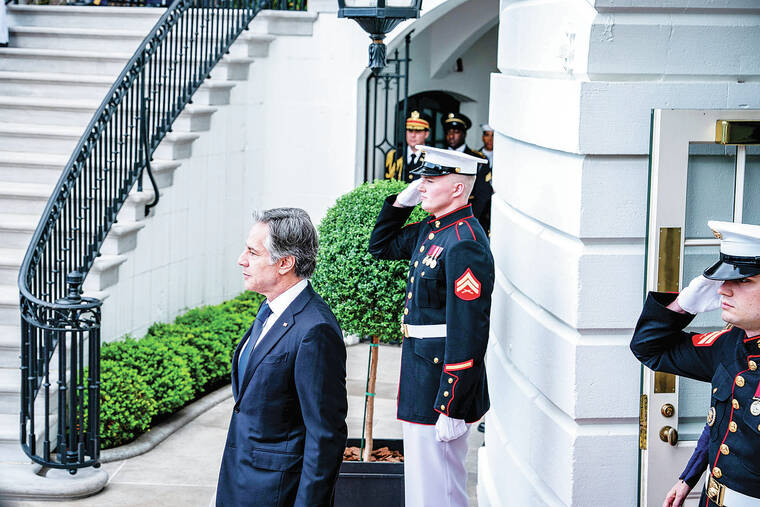Blinken turns up pressure on Hamas to accept Gaza cease-fire deal
JERUSALEM — Secretary of State Antony Blinken delivered twin messages to Hamas and Israel on Wednesday, pressing Hamas to accept a cease-fire proposal while at the same time urging Israeli leaders to put off a major ground invasion into the thickly populated southern Gaza Strip city of Rafah.
On the last day of a Middle East trip, his seventh visit to the region since the war began in October, Blinken tried to turn up the pressure on Hamas.
ADVERTISING
“We are determined to get a cease-fire that brings the hostages home and to get it now, and the only reason that that wouldn’t be achieved is because of Hamas,” Blinken said at the start of a meeting in Tel Aviv, Israel, with Isaac Herzog, the president of Israel. “There is a proposal on the table, and as we’ve said: No delays, no excuses. The time is now.”
The proposed agreement calls for the release of 33 hostages in the initial stage of a cease-fire and would lead to the release of Palestinian prisoners being held in Israel.
Blinken’s comments, which were made in Tel Aviv and Jerusalem, were part of a concerted campaign by the Biden administration to secure a pause in a war that, Gaza officials say, has killed more than 34,000 Palestinians. The bloodshed has roiled American campuses and is seeping into domestic politics.
Blinken also made clear that he expected more from Israel.
Speaking to reporters Wednesday night after a day of meetings with Israeli leaders, including nearly three hours with Prime Minister Benjamin Netanyahu, Blinken said that the Israelis had not convinced him that they can prevent the humanitarian catastrophe that is feared should there be a ground invasion of Rafah.
“We cannot, will not, support a major military operation in Rafah absent an effective plan to make sure that civilians are not harmed — and no, we’ve not seen such a plan,” Blinken told reporters. “There are other ways, and in our judgment better ways, of dealing with the real, ongoing challenge of Hamas that does not involve, require, a major military operation.”
Blinken’s visit to the Middle East, which began Monday, came as Israel is both softening some of its demands in negotiations over a cease-fire and digging in on its vow to move into Rafah “with or without a deal,” as Netanyahu put it this week.
In its latest proposal, Israel said it would ease travel back to northern Gaza for Palestinian civilians uprooted by its assault, according to two Israeli officials. That is a sharp reversal on an issue that has been a sticking point in the talks.
It was not clear whether Hamas would accept the Israeli proposal.
On Wednesday night, a spokesperson for the group, Osama Hamdan, said in an interview on Lebanese television, “Our position on the current negotiating paper is negative.” But the Hamas press office later clarified those comments. “The negative position does not mean negotiations have stopped,” the press office said. “There is a back-and-forth issue.”
On Wednesday, Blinken also visited an inspection checkpoint at Kerem Shalom, a southern border crossing between Israel and Gaza.
Across the border Wednesday, Israeli airstrikes continued. The Gaza Health Ministry said Wednesday that the bodies of 33 people killed in strikes had been brought to local hospitals over the past 24 hours.
© 2024 The New York Times Company


